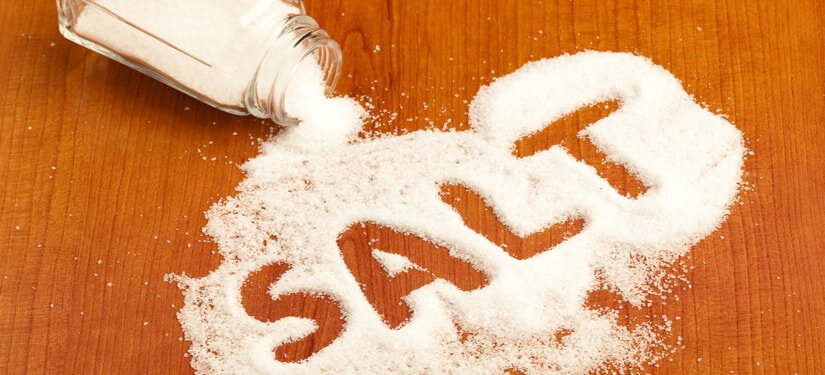Salt has been around for centuries. Because of its ability to add flavor and preserve food items during eras when refrigerators do not yet exist, it has become a commodity around the world. Powerful nations even trade pounds of their gold for a sack of this fine, white crystals.
But now, salt is so abundant that we can find it in anything-pasta sauces, pizzas, even in bread. And as we develop ways to make our food last longer and more flavorful through this item, the problem of consuming too much salt, or more specifically the sodium abundant in it, is slowly creeping in. According to Mayo Clinic, a typical American ingest more or less 3,400 milligrams of sodium per day-a thousand more than a healthy individual and approximately two thousand more than those who have heart problems.
Sodium has a role in regulating blood pressure, looking out for your fluid levels, and transmitting “brain” messages. Too much of it, however, can slow down these jobs, or make it worse. Here are five (of the many) examples:
It makes you bloat.
Think that it’s the lack of exercise that brings you the big, gassy stomach? It could be sodium. This nutrient, when taken in excess, absorbs vast amounts of water from your cells and transmits it into your systemic circulation. Once a large volume of this fluid enters the bloodstream, your heart and blood vessels have to pump and contract extra hard to keep them from pooling in one place and bring complications.
While this may not kill you, feeling bloated can make you uncomfortable and self-conscious. This could affect your work productivity and daily activities.
It increases your high blood pressure.
As previously mentioned, your heart and blood vessels would be pressured to work more than usual to keep the diluted blood circulating all over your body. If the high-salt intake becomes a habit, your organs would eventually harden from contracting too much and develop lesions that could become a breeding ground for lumps, or in medical terms, plaques. These plaques could become an obstruction and eventually progress into atherosclerosis (a disease described as the narrowing and hardening of the arteries caused by plaques obstructing the passageway).
Atherosclerosis can bring a host of diseases such as stroke, heart failure, and even heart attacks. These ailments can cause death if left untreated.
It robs your bones of calcium.
I will spare you of the chemistry-related explanation and say this instead: too much sodium causes you to urinate a lot because you need to expel all the fluid it has absorbed. When we pee, we excrete calcium, a mineral that is essential for our bones and muscles to do their job in providing structural support.
Frequent urination brought by high-sodium intake means more calcium excreted out of the body, which can lead to increased risk of osteoporosis and other bone-related issues, including problems on dental health-teeth are made in calcium, too.
It brings stones.
And not just any stones from under the earth. Stones are brought by an impaired kidney function and by accumulating too much calcium in these bean-shaped organs.
Kidneys filter the waste products out of the fluids (water, blood) before it is transported throughout our system. These wastes include sodium and calcium. While sodium can be easily flushed out because it can dissolve in water, calcium is not. In time, this mineral crystallizes and becomes stones, which, if left alone, can bring severe complications to the kidneys and the whole organ system. Not to mention the fact that urination can be extremely painful and uncomfortable, especially if the stone ended up dislodged in the urinary pathway.
Because of its many disadvantages, finding ingenious ways to cut back salt from your diet is a must. Here are few ones you can adopt:
Cook at home.
There are a lot of advantages when you cook a home. One, it makes you in control on what you put in your food specifically the amount of salt, and two, it can be developed as a skill you can use in the near future. After all, why entrust the power to nourish yourself in the hands of others if you can do it on your own?
Experiment on herbs, spices, and other fresh ingredients.
Another perk of learning how to cook: it can channel your inner creativity. That is, in mixing herbs and spices. Contrary to what people believe, these wonderful plants can give as much taste and flavor as that of salt-plus it has zero calories!
Aside from the fact that it can curb your salt intake, some of these herbs can help improve your health. Cinnamon can help in blood glucose regulation, making it a perfect substitute for table sugar. Garlic can aid in fighting cancer. Finally, cumin can be a remedy for the gassy feeling you get after consuming too many salted peanuts.
As for fresh ingredients, most pre-made sauces and boxes of food items you can find in your local groceries contain crazy amounts of sodium (Trivia: The “natural preservative” most food manufacturers use is most likely salt). Avoid these processed foods and create one from scratch instead. If you want a pasta dish, skip the ready-to-eat tomato sauces and get the flavor from real, juicy tomatoes. Rather than using ranch dressing, make a salt-free version for your green salad. There are tons of recipes available on the Internet.
Skip the dips and shaker.
After making a dish made up of so many ingredients, some of us would continue to add more flavor by putting in condiments. While that is not necessarily bad, most seasonings out there are typically salt-based. One tablespoon of soy sauce contains about 880 milligrams, and most of us can consume more than that in one meal!
Putting in salt using a shaker cannot help you in controlling how much of it you put in your dish. A teaspoon of this already contains more than 2,300 milligrams-a little less than your daily requirement. Save yourself the heartache (literally) and keep the shaker out of your dining table.
Load up on potassium.
Sodium and potassium are like the yin and yang of blood pressure regulation: sodium contracts the blood vessels while potassium relaxes them as blood passes through. This mineral also helps in excreting excess sodium through the urine
It is safe to say that potassium “tames” the sodium before it can wreak havoc on your body. That is why it is understandable that we need more potassium (about 4,700 mg a day) than sodium (approximately 2,400 mg a day).
To reach this amount, you must consume food items that have this nutrient. Hint: They’re not only found in bananas. In fact, root crops such as sweet and white potatoes and black, white, and edamame (whole soy) beans contain more potassium than these yellow fruit staple. Spinach and watermelon are excellent sources, too.
Too much of one thing is indeed not okay, and salt is just one of the many examples. It’s hard to comprehend how these tiny crystals can cause so much damage to your body when taken in excess. Thankfully, nature has given us better alternatives to avoid succumbing to the problems salt can bring. Start investing in healthier ingredients today!

